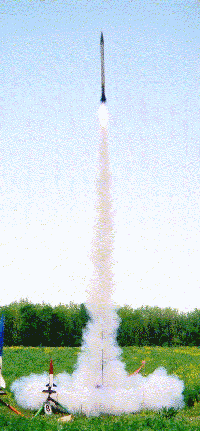| Construction Rating: | starstarstarstar_borderstar_border |
| Flight Rating: | starstarstar_borderstar_borderstar_border |
| Overall Rating: | starstarstarstar_borderstar_border |
| Diameter: | 3.00 inches |
| Manufacturer: | LOC/Precision  |
| Style: | Cluster |
Brief:
It is a nice mid-high power rocket that makes you enjoy clustering
Construction:
The packaging was standard Loc plastic bag but it made it through the mail ok. The fins were hard to align because they just stuck in between the motor tubes. I did ok by using a square. Everything else went ok. The instructions were vague to me but that's ok I had a lot of fun figuring it out (no note of sarcasm). It was easy to build and that's good because my previous rocket was Estes ARV condor which I had trouble with. Put the launch lug on before you put the fin section on the rocket. Also fill all gaps between the motor tubes and the coupler before installment of the fin section (that was an interesting mess).
Finishing:
Paint her any way you please just don't you use kylon primer and enamel spray paint (had a bad reaction almost ending up buying new tubes. The nose cone won't take paint very well so put a clear coat over it to protect it. It looks awesome and technical.
Construction Rating: 3 out of 5
Flight:
It's difficult to ignite . I used two G40-7w's and had no problem but if you don't have the right equipment it doesn't work. Prep was a breeze but it will be harder once I get my camera built.
Recovery:
Standard elastic band and wadding. It needs a bigger chute. It set down with a thud and almost broke the fin.
Flight Rating: 2 out of 5
Summary:
If you don't have a decent launcher don't get it. It puts out a lot of thrust and requires a lot of power to ignite. If you won't accept that your maiden voyage might do loops don't try it. I loved it and she will fly again (maybe two H's he he he evil grin)
Overall Rating: 3 out of 5
Other Reviews
- LOC/Precision 4-29SS By Moira Jean Whitlock
Single staged, but with the choice of being flown with two or four 29mm motors, specified as 2 G type or 4 F type. It has the fins attached wedge style between the four motor tubes, which extend below the main body tube. The nose cone is hollow plastic, and the fins are precut plywood. The tubes are spiral wound kraft paper. The parachute is a lightweight pink nylon. Very bright ...
 |
 |
Flights
 |
 |
B.R. (September 1, 2000)
T.M. (July 1, 2001)
R.M. (August 1, 2001)
D.J.D. (September 19, 2001)
P.V. (August 2, 2003)
 I am really pleased with this kit. As my first cluster kit I was expecting some problems but construction went very smoothly. I have only flown it once on two G35-7 motors. Using two motors was easy because there is no external plugging required if you follow LOC's instructions and permanently plug two of the motor tubes at the top before attaching the fin assembly. I used Quickburst Twiggy igniters and the rocket took off with very little delay. I flew to around 2,000 feet and was recovered nearby on a Top Flight 30" X-type chute without damage. I highly recommend this kit for those who enjoy clusters.
I am really pleased with this kit. As my first cluster kit I was expecting some problems but construction went very smoothly. I have only flown it once on two G35-7 motors. Using two motors was easy because there is no external plugging required if you follow LOC's instructions and permanently plug two of the motor tubes at the top before attaching the fin assembly. I used Quickburst Twiggy igniters and the rocket took off with very little delay. I flew to around 2,000 feet and was recovered nearby on a Top Flight 30" X-type chute without damage. I highly recommend this kit for those who enjoy clusters.
Sponsored Ads
 |
 |












B.W. (December 1, 1999)